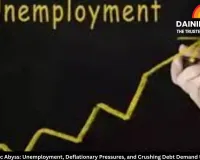India’s Economic Freedom Dilemma: Is the Constitution a Hidden Roadblock?
Digital Desk

For older Indians, the memory of waiting months for a BSNL landline, often navigating bribes and bureaucratic delays, remains a stark reminder of a state-controlled past. While India has since embraced capitalism and witnessed a digital revolution, a pressing question emerges: Is the Indian Constitution, with its socialist roots, acting as a hidden barrier to the economic freedom aspired to by its youth?
Recent data paints a concerning picture. India ranks a low 128 in the Heritage Foundation’s 2025 Index of Economic Freedom. This ranking evaluates factors like property rights, judicial efficiency, regulatory burden, and open markets areas where India consistently underperforms.
The core of the issue lies in the Constitution's philosophical foundation. Crafted in a post-colonial era wary of exploitative capitalism, it established a welfare state. Directive Principles of State Policy (DPSP) emphasise social and economic justice, reducing inequality, and state control over key sectors. While noble in intent, these principles have often translated into an over-sized bureaucracy and a culture of red tape that stifles initiative.
Specific constitutional provisions create significant hurdles. Article 19(1)(g) grants the freedom to choose one’s profession. However, Article 19(6) allows the state to impose "reasonable restrictions" in the "public interest," a vague term that has historically justified extensive control. This was infamously used to nationalise banks in the 1970s, creating uncertainty for private investment.
Furthermore, the Constitution's federal structure sometimes fragments the economic landscape. While the GST was a landmark reform, state-level regulations on land and other subjects can hinder the creation of a seamless national market, unlike China’s top-down implementation of its economic zones.
The result is a system where grand government schemes like "Startup India" are launched, but entrepreneurs face a slow, often corrupt, bureaucratic machinery. Stories of approved startup funds taking 11-12 months to be released are common, by which time market dynamics have shifted.
However, a cultural shift is underway. The youth, inspired by digital success stories and influencers, are increasingly looking beyond government jobs towards entrepreneurship and the private sector. This generational aspiration for economic freedom is challenging the old, socialist mindset.
The path forward requires an evolution. The Constitution itself is not immutable, but the Supreme Court's "Basic Structure Doctrine" protects its core welfare character. The challenge is to reinterpret this framework to foster innovation, protect property rights, and streamline regulation. The government's role must shift from being the primary driver of the economy to an efficient facilitator that ensures a level playing field, punishes corruption swiftly, and truly unleashes India's economic potential. Until then, the constitutional contradiction will remain a significant hurdle on the road to a developed India.


.jpg)



.jpg)




